- Home
- Upton Sinclair
O Shepherd, Speak! Page 24
O Shepherd, Speak! Read online
Page 24
II
All Lanny Budd’s magic was dead, or dying. No longer was he a privileged character, no longer was the path made smooth before his feet. They knew him at the Mayflower Hotel and consented to give him a bed to sleep in, but there would be two other men in the room and he would be limited to five days. Perhaps they thought he had something to do with the funeral; he could guess from their manner that after it he would have to present new credentials, fresh evidence of being a VGDIP. Sooner or later it would be that way with all the New Dealers.
He stayed on in Washington because he had no other place to go. He wanted time to think and to decide what to do with the rest of his life. He walked the streets of this grief-stricken city, and saw how, after the funeral, people dried their tears and resumed their daily tasks. The King was dead, long live the King—the word “long” meaning three years and nine months, the time which Harry Truman would have to serve. Lanny walked by the White House, where people stood gazing through the iron fence, remembering the old and perhaps hoping to get a glimpse of the new.
Lanny could have got an introduction and gone in and told the new King what he had done for the old. But he knew that Truman would be swamped with problems and harassed by fears, and would be forced to use the help of persons he already knew. The trip to Stalin was off, and the job of being a friend to the great was done forever. Charlie Alston happened to be somewhere out West and when he came back would find that he too was a “has been.” Harry the Hop would get the rest he so desperately needed, and the “social door” of the White House would open for a new set of favorites, mostly from Missouri.
Lanny was soon to have that million dollars, and perhaps it was his duty to settle down to the problem of how he meant to spend it. He went over the idea in his mind but found that he could not get up the courage. His mind was haunted by grief; this bereavement was the most tragic thing that had ever happened to him, and he couldn’t bring himself to face the fact that he would never see that great friend, never hear his voice again. Tears would well into his eyes unexpectedly, from despair deeply buried in his soul. He was restless and distracted; he couldn’t settle down to any desk job, he couldn’t get up any interest in the idea of changing the world—at least not until he knew definitely what part Harry Truman was going to play in it.
An active job was what he wanted, and he found his thoughts turning to Europe. If he couldn’t go to Moscow, at least he could go to Paris, and later to Berlin. If he couldn’t be a presidential agent, at least he could stay an assimilated colonel and carry out some of the earlier tasks his Boss had assigned to him. He could keep on the move and distract his mind. Laurel was somewhere in Germany, and he could join her; he could still have a roving commission, and use it to try to run away from his sorrow.
III
He telephoned Robbie. No use talking to him about grief, for Robbie, while outwardly polite and considerate, would in his heart be vastly relieved at having got rid of his worst enemy. A wonderful thought, that there might be in the White House a man who could be persuaded to reduce taxes and let Robbie refuse to raise wages! The less the son probed into the father’s mind on the subject of F.D.R., the better for both of them.
Lanny, equally polite and considerate, said that he was studying paintings in the National Gallery and would Robbie please forward his mail. There was a cablegram, and Lanny said, “Open it and read it to me.” It was from Laurel: “Courage. Remember we still have each other. Come soon.” Lanny had a hard time keeping his voice from choking. He asked about the health of the baby and Frances, and then said, “My love to everybody,” and hung up.
Yes, the place for him was Germany. He could still be somebody there, still watch events and perhaps influence them ever so slightly. He could see this war to its end, at least as far as Europe was concerned, and by that time he might have clearer ideas about how to prevent the next war. He went to see the Monuments people in Washington and told them his story; he was inclined to operate under their auspices, because theirs was the subject he knew best. They were glad to have his report and his promise of help.
He went to Alsos and introduced himself; they had heard good reports of him and wanted him in their department. Art works would keep, they argued, but scientific secrets might shorten the war with Japan by a year. He went also to General Donovan, the head of OSS, who knew most about what Lanny had done for F.D.R., and was pleased to give him credentials. The genial Irish-American lawyer wanted Lanny to pose as a Nazi again and find out about the plans for the Alpine Redoubt, and for activities of the “werewolves”! Lanny had to say no; he no longer had any faith in his ability to pose as a Nazi. He would interview important Germans behind the American lines.
He had his choice of routes and preferred the northern this time; he wanted a day in New York and one in London. Hansi and Bess were giving a concert that night, and Lanny got there in time for it. Afterward they sat in a hotel room, talking for hours; for the first time Lanny was free to tell what he had been doing for Roosevelt and what he thought of him. To Hansi the dead President was a hero-statesman, for Bess he was a bourgeois politician, admittedly a cut above the others. She politely refrained from arguing, however; all three of them wanted the Nazis licked, and all approved the salvage of art works, so they thought on these things. (“Finally, brethren, whatsoever things are true, whatsoever things are honest, whatsoever things are just, whatsoever things are lovely, whatsoever things are of good report … think on these things.”)
Hansi mentioned that his nephew, Freddi junior, had had his heart’s desire and been shipped overseas. Being tall, he had misrepresented his age, volunteered, and taken the stiff training of a private soldier. Now he was what had been called a “replacement,” but the Army had decided that the word sounded suggestive of death and destruction, so he was a “reinforcement.” His grandfather, Johannes Robin, had pulled wires and got him into the Seventh Army. Young Freddi had it as a dream of his life to be in at the capture of Dachau and perhaps meet some survivors who had known his father. Lanny said with a smile, “Maybe I can take him there.” He made note of the lad’s unit and promised to look him up if possible.
IV
Next morning Lanny dictated business letters, had a talk with Zoltan, then took a taxi to Mitchel Field, from which he took off in a passenger plane for Gander Lake in Newfoundland: a place of many memories for the onetime P.A., including a strange psychic experience to which he had paid no heed. Amazing how the place had grown in three or four years; it was now one of the great airports of the world, through which the giant bombers from American factories were streaming to the battlefronts.
Lanny’s plane stopped only for refueling, then set out over those cold waters where he had come so near to losing his life. This time the weather was foggy but quiet, and they did not stop at Greenland but went on to Iceland, that strange country of glaciers and hot springs. Here was another immense field, where unwanted Americans were being carefully polite to the natives. Since the Icelanders didn’t want to be taken permanently by Nazis they had to be taken temporarily by Americans, and both sides had to make the best of the trying situation. Geography was to blame.
Again the plane was refueled and flew to another great base, near the little village of Prestwick, Scotland, celebrated as the birthplace of Britain’s greatest golfer. From there you could take a train to London, or, if you were in a hurry, you could be flown to a nearer airfield. Lanny had cabled to Sir Eric Vivian Pomeroy-Nielson, Baronet—you had to give full names when you cabled in wartime and pay for every word. Now he telephoned and learned that the cablegram had not yet arrived. Rick and Nina, delighted, would take the first train for London and meet him at the Savoy; he was no longer a secret agent, meeting his friends clandestinely, but a perfectly respectable assimiliated colonel, wearing a uniform but without insignia.
“What friends thou hast and their adoption tried, grapple them to thy heart with hooks of steel.” Some of the commentators make it “hoops,” but in
either case it is sound advice, and Lanny had followed it. Thirty-two years had passed since the baronet’s son and the grandson of Budd Gunmakers had met at the Dalcroze dancing school at Hellerau, near Dresden, and there had been few of these years when they had not met at least once. In the beginning Rick had been a tall dark-haired lad, intense but reserved, and very positive in his views; being a year or two older than Lanny, he had taken charge of Lanny’s thinking. Now he was still tall and slender, his hair turning gray, his face thin and lined. He wore a steel brace and walked with a limp because he had a bad knee, sustained in an airplane crash while fighting over France in World War I.
Ever since the Paris Peace Conference of 1919 Lanny had been quietly passing inside information to this English friend, who had been causing it to be published in the Socialist and Labor press of his country, from which sooner or later it found its way to the thinking world. If there were any political or social questions on which these two differed, Lanny had never found out about them. The threads of their beliefs had been so woven together that neither could have said who had contributed the greater quantity or the better quality.
Nina, whom Rick had married during World War I, was now a grandmother, but didn’t look it. A gentle quiet little body, she would sit and listen while the masterful males expounded their ideas; then, unexpectedly, she would make some remark that would surprise them by its pungency. How much she had contributed to her husband’s clear-sightedness would have been another problem for a psychologist.
V
They wanted to talk, first about Roosevelt and then about Truman. Rick had meant every word of his verses, and more; it was a tragedy without parallel in history; like seeing the driver of a team of wild horses drop dead while they were at full gallop. Lanny said, “Trio of wild horses,” and told his friend what F.D.R. had said at their first meeting, comparing himself to the driver of a Russian troika. His three horses were the Southern Democrats, a whole generation behind the rest of the country in their thinking; the hierarchy of the Catholic Church in the great cities, such as New York, Boston, Chicago, and Los Angeles; and finally, the labor unions and their “intellectual” sympathizers. Three of the wildest steeds imaginable, each desiring to travel to a different goal; yet the Democratic party could never win a victory without all three, and it had been Roosevelt’s task to keep them in harness and on the highway.
“And now they will fly apart!” exclaimed the Englishman.
Lanny could only say, “I fear so; but I don’t think the reactionaries, if they come back, will dare repeal more than a small part of the New Deal. That’s the way America travels, two steps forward and one step back.”
“It’s not only a question of your domestic affairs, Lanny; it’s a question of saving Europe and Asia from Bolshevism. The only way it can be done is by American support to the democratic Socialists everywhere; and what is your Harry Truman going to make of that problem?”
“God knows,” Lanny was forced to reply. “I am afraid you Englishmen will have to teach him, and teach the rest of America. I mention the subject now and then to one of our brass hats, and he looks at me hard, trying to make up his mind whether I am a secret Communist agent or just a harmless nut.”
That brought them to the subject of the Chattersworth bequest and what Lanny was going to do. He had written his friend long letters about it and now he said, “Whatever plan we choose, whether it’s a newspaper or a magazine, or pamphlets and books, you are to come and be the editor, the boss.”
Rick answered gravely, “I couldn’t do that. You know I have agreed to stand for Parliament for the Labour party.”
“Yes, Rick, and I know how much that would mean to you and how much you could accomplish. But there are many who could serve competently in Parliament, while there’s only one man who can help me with this big job.”
“It would be absurd for me to come to America and give advice to your people. I have never even been in the country.”
“If we have any idea of preventing the next war we shall have to reach the entire world, and not just America. It isn’t in any sense a local job. And what legwork has to be done I can do for you; I am good at meeting people and picking up information, but I’m no good at writing and I don’t know the first thing about editing. I know you and your outlook on world affairs. We’d never have to argue about policy; we did all that thirty years ago.”
Rick said, “I’d feel like a deserter if I quit my job here. We have a real chance to carry the country at the elections which must come as soon as this show is over.”
“It’s all one job,” argued Lanny, “whether you are doing it in London or New York. As a matter of fact, I have the idea that we should have our office in some small place, where rents would be cheaper and labor easier to get. Ours is a long-term job and not spot-news journalism.”
“I see you’ve been thinking about it,” said the Englishman, still with the serious look upon his thin nervous face. “Have you invented any way to get me out of my agreement with the Labour chaps?”
“Indeed yes. Let Alfy take the job.”
“Alfy!”
“He’s young and he doesn’t have your handicap of lameness. What I’m offering you is a desk job, suitable for a man of middle years. Cultivating a constituency would wear you to skin and bones. Alfy knows the movement, and he has a fine record, flying first for Spain and then for Britain. The fact that Franco threw him into a dungeon ought to be good for several thousand votes. Take him around and introduce him, hear him talk a few times and coach him. Tell your committee that you aren’t physically equal to the job and get them used to Alfy.”
Rick smiled for the first time. “You make it very plausible. But it would be a serious matter for us to pull up stakes and emigrate.”
“It won’t be a lifetime job. I plan to spend all the money in five years, and I hardly think we’ll find an angel to keep us going. Your boys are grown, and you can leave the place to them for a while, or maybe bring one of them with you. We’ll pick out some village in New Jersey or Long Island, and find you a one-story bungalow where you and Nina can be Darby and Joan.”
“What do you say, Joan?” inquired “Darby.”
“I say we’ll think it over,” she replied. “We’ll let you know.” And so they left it.
VI
It was Lanny’s duty to telephone to Irma Barnes Masterson, Countess of Wickthorpe, his onetime wife, and tell how their fifteen-year-old daughter was faring at Newcastle. It was an entirely good report; she was doing well at school, and was happy with all her associates. Irma told her former husband that there had not been a V-bomb on Britain for nearly a month, and Lanny said, “I think that is probably all over; if your troops haven’t got the last of the launching sites they must be close to them.”
“Then, Lanny, you are going to bring the child home to me! You promised!”
“Surely not until the end of the school year,” he protested. “She is doing well and it would be a shame to interrupt her.” He added on the spur of the moment, “Why don’t you and Ceddy go over and pay her a visit? The last of the U-boats will be out of the seas before long; and you would get a royal reception. You are still a Budd-Erling stockholder, I suppose, and it should interest you to see where the money is coming from.”
“I’ll propose it to Ceddy,” she answered. “He thinks about nothing but his crops these days.” His lordship had come pretty close to treason, as Lanny knew, because of his sympathy with Nazi ideas. Did his conscience trouble him, or was he just trying to square himself with his neighbors by turning his great estate into a model agricultural project?
Lanny didn’t offer to come out to the Castle and make a fuller report. He had a good excuse, that he was flying to Paris that afternoon. He dutifully inquired about the health of his former mother-in-law and about Irma’s two little boys, the Viscount and the Honorable; they had pink cheeks and golden hair like the earl, their father—only his hair, alas, was touched with gray.
“
He says that England is going to be a poor country when this war is over,” remarked the daughter of a Chicago traction king.
Lanny couldn’t restrain a chuckle. “Save your money, old dear,” he said. “Robbie is expecting the government to begin canceling orders any day now.”
“Oh, surely not!” exclaimed Irma in distress. “Won’t they be needed to fight the Japs?”
“Yes, but those in Europe can be flown to the Far East or taken by carriers.”
“Oh, putrid!” exclaimed the hostess of the “Wickthorpe set.”
VII
When Lanny arrived in Paris, ten days after the death of Roosevelt, Georgie Patton had plunged all the way across Germany and reached the western tip of Czechoslovakia. The Seventh had reached Stuttgart and Nürnberg, the First had reached Leipzig, and the Ninth was spread along the Elbe River. The British were nearing Bremen and Hamburg, the Canadians were all the way up through Holland and close to the German naval base of Emden. A million prisoners had been taken in three weeks. If Germany had not been in the hands of a madman, she would have given up long ago.

 Prince Hagen
Prince Hagen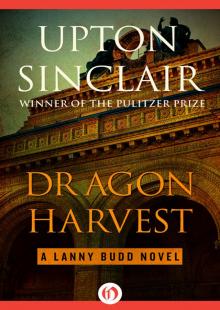 Dragon Harvest
Dragon Harvest The Jungle
The Jungle Sylvia's Marriage
Sylvia's Marriage Oil! A Novel by Upton Sinclair
Oil! A Novel by Upton Sinclair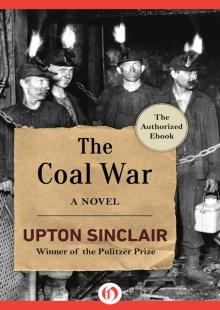 The Coal War: A Novel
The Coal War: A Novel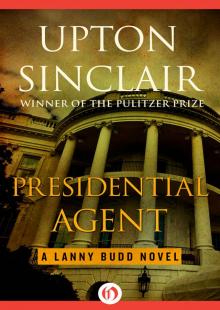 Presidential Agent
Presidential Agent World's End
World's End The Second-Story Man
The Second-Story Man O Shepherd, Speak!
O Shepherd, Speak!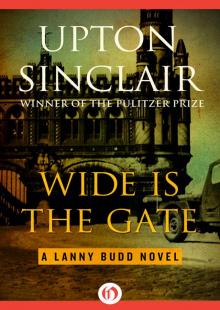 Wide Is the Gate
Wide Is the Gate The Return of Lanny Budd
The Return of Lanny Budd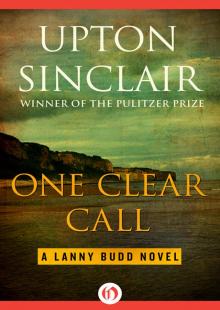 One Clear Call I
One Clear Call I 100%: the Story of a Patriot
100%: the Story of a Patriot The Machine
The Machine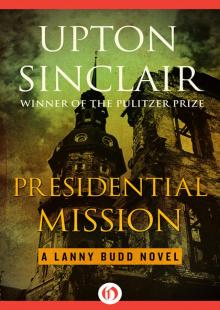 Presidential Mission
Presidential Mission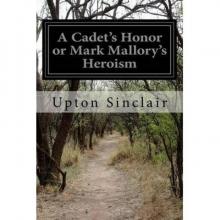 A Cadet's Honor: Mark Mallory's Heroism
A Cadet's Honor: Mark Mallory's Heroism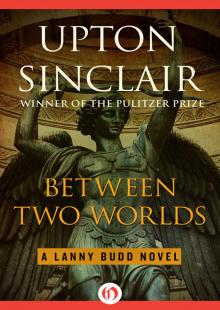 Between Two Worlds
Between Two Worlds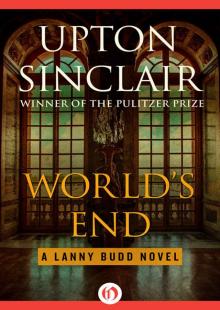 World's End (The Lanny Budd Novels)
World's End (The Lanny Budd Novels)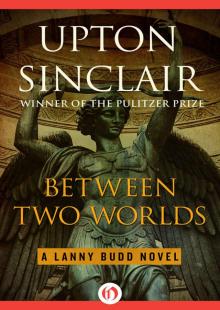 Between Two Worlds (The Lanny Budd Novels)
Between Two Worlds (The Lanny Budd Novels)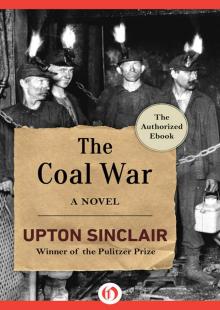 The Coal War
The Coal War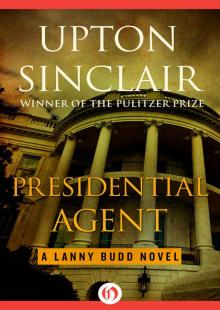 Presidential Agent (The Lanny Budd Novels)
Presidential Agent (The Lanny Budd Novels) Oil (filmed as There Will Be Blood)
Oil (filmed as There Will Be Blood)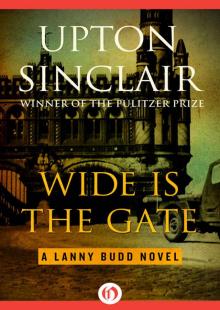 Wide Is the Gate (The Lanny Budd Novels)
Wide Is the Gate (The Lanny Budd Novels)